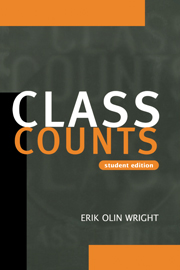Book contents
- Frontmatter
- Contents
- Preface to student edition
- Preface to original edition
- Acknowledgments
- 1 Class analysis
- Part I Structural analyses of classes
- Part II Class and gender
- Part III Class structure and class consciousness
- Part IV Conclusion
- 12 Confirmations, surprises and theoretical reconstructions
- References
- Index
- Index of subjects
12 - Confirmations, surprises and theoretical reconstructions
Published online by Cambridge University Press: 22 September 2009
- Frontmatter
- Contents
- Preface to student edition
- Preface to original edition
- Acknowledgments
- 1 Class analysis
- Part I Structural analyses of classes
- Part II Class and gender
- Part III Class structure and class consciousness
- Part IV Conclusion
- 12 Confirmations, surprises and theoretical reconstructions
- References
- Index
- Index of subjects
Summary
Class analysis, in the Marxist tradition, stands at the center of a sweeping analysis of the dilemmas of contemporary society and the aspirations for an egalitarian and democratic future for humanity. Class is a normatively charged concept, rooted in ideas of oppression, exploitation and domination. This concept underwrites both an emancipatory vision of a classless society and an explanatory theory of conflicts, institutions and social change rooted in intrinsically antagonistic interests. The ultimate ambition of this kind of class analysis is to link the explanatory theory to the emancipatory vision in such a way as to contribute to the political project of transforming the world in the direction of those ideals. Marxist empirical research of whatever kind – whether ethnographic case studies, historical investigations or statistical analyses of survey data – should further this ambition.
At first glance, it may seem that the empirical studies in this book have little to do with such grand visions. The topics we have explored have revolved around narrowly focused properties of contemporary capitalist societies rather than the epochal contradictions which dynamically shape social change. While I have invoked the themes of transformative struggles, only a pale reflection of “class struggle” has appeared in the actual empirical analyses in the form of attitudes of individuals. And, while the concept of class we have been exploring is conceptualized in terms of exploitation, none of the empirical research directly explores the problem of exploitation as such.
- Type
- Chapter
- Information
- Class Counts , pp. 251 - 276Publisher: Cambridge University PressPrint publication year: 2000



